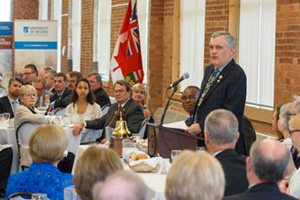UOIT and Rotary Club of Oshawa welcome Lieutenant Governor
May 7, 2014

Together with the Rotary Club of Oshawa, the University of Ontario Institute of Technology (UOIT) proudly welcomed the Honourable David C. Onley, Lieutenant Governor of Ontario to campus on May 5.
“The University of Ontario Institute of Technology was delighted to co-host His Honour and to congratulate him on his legacy of raising awareness of accessibility issues, and for building bridges between Ontario’s First Nations, Métis and Inuit and non-aboriginals across the province,” said Susan McGovern, UOIT Vice-President, External Relations and Advancement.
The Lieutenant Governor visited Oshawa, Ontario to speak about accessibility, with local civic leaders in all fields of business, education, the arts, non-governmental organizations, the military and government. Having experienced polio as a child and now living with post-polio syndrome, he has become an advocate for removing the barriers that limit individuals with disabilities from contributing to the workplace.
“The Lieutenant Governor’s mandate is to raise awareness for accessibility or that which enables people to achieve their full potential,” said Jim Scott, President, Rotary Club of Oshawa. “Like Mr. Onley, the Rotary Club of Oshawa and Rotary International work to eradicate polio worldwide and to provide support for community organizations that improve accessibility.”
About accessibility at UOIT
UOIT actively serves several hundred students, both graduate and undergraduate, through its Student Accessibility Services (SAS). SAS is dedicated to ensuring the success of all students, promoting an accessible and inclusive environment for work and study, and works to identify, remove and prevent barriers to persons with disabilities.
SAS specialized services include:
- Accessible format for course materials
- Adaptive technology and training
- Alternative testing services
- Deaf and hard of hearing services
- Learning skills support
- Note-taking services and or audio/video recording of lectures
- Peer mentoring and peer tutoring
- Sign language interpreters
- Transition support for new students
- Workshops and education tailored for students with disabilities



